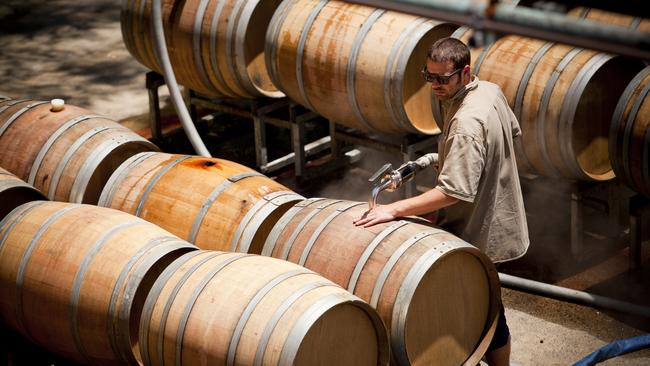Pubs and bottle shop giant’s push into wineries leaves complex taste
The same company that sells wine at bottle shops and pubs has been quietly buying up wineries, and not everyone is happy about Endeavour Group’s spending spree.
From the vineyard to your local pub, bottle shop and even your front door, the landscape for buying wine has been changing dramatically – and it may become more costly for consumers.
The nation’s biggest pub owner and alcohol retailer, Endeavour Group, has been grabbing headlines because of a bitter boardroom battle, but in the background has been buying up wineries across Australia.
Endeavour’s huge national reach includes liquor retailers Dan Murphy’s and BWS and 350 hotel venues. It also owns wine bottling, packaging, delivery and auction businesses, and a growing number of wineries including Oakridge, Chapel Hill, Shingleback and Cape Mentelle, which it bought this year.
The company was listed on the stock exchange two years ago, when it was separated from former owner Woolworths, which still holds a 9.1 per cent stake.
While Endeavour has signalled no more winery purchases, its push into the sector has divided opinion.
Major shareholder and billionaire Bruce Mathieson Snr, who holds 15 per cent of Endeavour, is concerned about the wineries strategy.
“They are expensive assets that are capital intensive,” he said. “You don’t need to own the wineries to buy wine.”
Bill Wavish, the former Woolworths senior executive and Myer chairman who – with Mr Mathieson’s backing – is fighting for a board seat at Endeavour, has indicated he would review the wineries if elected.
However, at its recent results announcement, Endeavour noted the strength and scope of its Pinnacle Drinks business that delivered $1.7 billion of retail sales and launched 550 new products last financial year. “We’ve also seen continued very strong growth in the sales of luxury and premium wines,” Endeavour CEO Steve Donahue said.
Analysts say the struggling wine sector, parts of it deep in debt and experiencing a glut of grapes, could dish up more buying opportunities.
If winery ownership becomes dominated by big players, there is potential for higher prices for consumers – as Australians have seen with airline fares – although the industry is still seen as fragmented.
Baker Young managed portfolio analyst Toby Grimm described Endeavour’s winery expansion strategy as “full vertical integration”.
“They hope they can cut on the middleman and have a lower cost of product to sell to consumers and make a better profit margin,” he said.
This was not yet paying off despite Endeavour’s “very dominant market position”, Mr Grimm said, and the company’s share price has dropped almost 30 per cent in the past year.
He said the current board battle ahead of the October 31 annual meeting “reflects the fact that people aren’t happy about the underperformance of the share price”.
“Sometimes diversification can bite you.”
Bell Direct market analyst Grady Wulff said Endeavour’s share price was hit by broader negative sentiment towards consumer discretionary stocks amid the high cost of living.
“Endeavour’s acquisitions in the wineries to build the company’s Paragon Wine Estates brand have covered some historic, credible and award-winning names in leading global wine regions including New Zealand, Western Australia, Tasmania and South Australia,” she said.
“In the current rising cost environment, companies in every sector are looking for ways to cost cut and streamline operations.
“For companies like Endeavour Group and larger names in the consumer discretionary sector, cost cutting involves eliminating out middleman and acquiring the operations of product manufacturers like wineries. This trend is likely to continue.”
Infinity Asset Management portfolio manager Dominic Mlcek said Australia’s total wine exports fell 10 per cent last financial year.
“We expect to see more transaction activity across the wine sector with the likes of Accolade Wines, Treasury Wine Estate and Australian Vintage announcing asset sales, winery closures and/or strategic reviews of their portfolios in recent months,” he said.
“Whether or not this provides any further acquisition opportunities for Endeavour Group in the near term is uncertain with the recent acquisition of Cape Mentelle rounding out its geographical exposure.”

Mr Mlcek said Endeavour’s wine business was “relatively small” and not big enough to offset headwinds from weaker retail spending on liquor, higher costs for hotels and legislative changes within gaming that would impact the company’s earnings.
“As a result we’ve avoided owning the business since the demerger from Woolworths,” he said.
Sequoia Wealth Management senior private wealth adviser David Thang said Endeavour’s wine expansion strategy “makes sense and we don’t believe that the specific purchase of wineries is a drag on investment returns”.
But some parts of the wine industry remain under pressure, he said, with “inventory gluts developing”.
“We have seen Treasury Wine estates look to divest commercial volume assets in the past six months, while Australian Vintage has been floundering and is currently undertaking a broad strategic review,” Mr Thang said.
Privately-owned Accolade Wines recently sold two wineries to help reduce debt.
Mr Grimm said Endeavour, like several companies, was “repositioning towards a tougher tomorrow”.
“It gives them greater control over the branding and strategy behind the wines,” he said.
“At the end of the day companies are doing these things to earn more money, either by selling more or getting a higher margin. The best companies for investors are the ones that do both.”






To join the conversation, please log in. Don't have an account? Register
Join the conversation, you are commenting as Logout